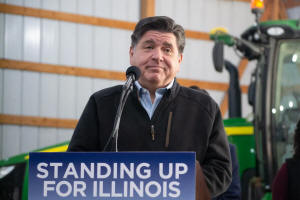House transit bill ‘not going forward,’ Pritzker says as he opposes new
revenue forms
[October 30, 2025]
By Ben Szalinski
SPRINGFIELD — Gov. JB Pritzker said he is emphatically opposed to
several revenue solutions House Democrats introduced Tuesday night to
fund public transportation in Illinois.
Speaking at an event Wednesday morning in Taylorville where he met with
Illinois farmers, Pritzker declared an amendment to Senate bill 2111
dead before it could even be called for a hearing in a House committee.
“As it is, it’s not going forward,” the governor told reporters.
“There’s got to be a lot of discussion between the House and the Senate
in order to come up with a final bill because it isn’t going to look
like what the House has put forward.”
The transit funding bill introduced by Rep. Eva-Dina Delgado, D-Chicago,
would raise between $1.5 billion and $2 billion to plug a funding gap
for Chicago area public transit agencies in the coming years by raising
taxes on entertainment, taxing billionaires’ investment assets, and
allowing speed cameras to be installed around the state.
Pritzker said, “They sprung a whole bunch of things that have never been
seen before” that makes the bill hard to evaluate and demonstrates
lawmakers still have a long way to go before there’s a solution that can
pass the General Assembly and earn his signature.
But Delgado characterized conversations with the governor’s office and
Senate differently.
“All of these ideas should not have been a surprise to them,” she told
reporters after the House Executive Committee advanced the bill out of
committee.
A spokesperson for Pritzker told Capitol News Illinois that’s “not
true.”

Speaking in the House Executive Committee early Wednesday afternoon,
Delgado said “we cannot allow it to just fall apart because we do not
agree on how to get” $1.5 billion in revenue.
Proposed taxes and funding
Most of the revenue raised by the proposal would come from a 7%
amusement tax that would apply to a wide variety of entertainment, from
streaming services to concert tickets and sporting events. In Chicago,
that tax would be levied on top of a 10.25% tax on streaming, a 9% tax
on other forms of entertainment, and a 3% tax on tickets.
Delgado also proposes establishing a $5 surcharge on large events in the
Chicago region with a capacity of at least 10,000 spectators.
In addition, the measure would tax billionaires on unrealized gains on
investment assets at a 4.95% rate — the state’s current income tax rate.
But Illinois’ billionaire governor said it raises too many questions.
[to top of second column]
|

Gov. JB Pritzker appears skeptical as he takes a reporter’s question
about a transit bill filed in the Illinois House the evening prior
to his Wednesday, Oct. 29, news conference in Taylorville. (Capitol
News Illinois photo by Jerry Nowicki)

“It’s never been done before,” Pritzker said. “Never been done before by
any state. Never been done before by the federal government. So once
again, you’ve got to do a whole lot of work before you can pass a bill
that … you don’t even know how it would work or if you could actually
collect on it.”
Another portion of revenue would come from allowing municipalities to
install speed cameras near churches, parks, schools and hospitals like
Chicago currently does. Rep. Kam Buckner, D-Chicago, told Capitol News
Illinois on Tuesday that municipalities have been asking for permission
to install the cameras. They would be allowed to keep half of the
revenue.
“It’s a bad idea,” Pritzker said. “We’ve had so many problems with speed
cameras in this state. There’s been corruption around them.”
Bill on thin ice
With Pritzker opposed, the bill faces a major uphill battle over the
final scheduled days of the General Assembly’s fall veto session, which
is the last time lawmakers are scheduled to convene this year.
Delgado characterized the bill during an interview Tuesday as the
House’s best solution. The Senate passed its own plan in May that was
not considered by the House before it adjourned. It’s not clear whether
the Senate was consulted when the House bill was crafted.
Illinois labor unions support the bill, however.
“The time for talk is over,” Illinois AFL-CIO President Tim Drea told
the House Executive Committee on Wednesday. “We have to get this
finished. We respectfully ask everybody in this House, this committee …
to vote this bill out so we can advance it to where we can look at
differences.”
Capitol News Illinois is
a nonprofit, nonpartisan news service that distributes state government
coverage to hundreds of news outlets statewide. It is funded primarily
by the Illinois Press Foundation and the Robert R. McCormick Foundation.
 |